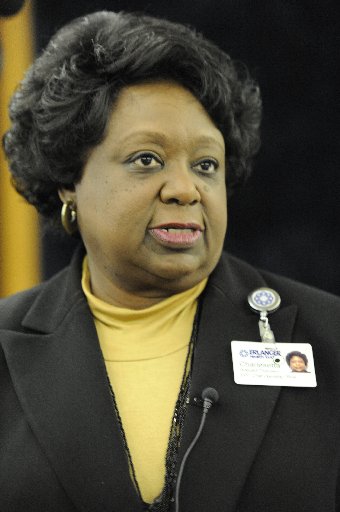After hearing a week of charged testimony, Judge Neil Thomas announced today that lawyers settled the $25 million termination lawsuit filed against Erlanger hospital by a former interim chief executive officer.
The $900,000 settlement grants Charlesetta Woodard-Thompson $600,000, with the other $300,000 going to her attorneys, Lawrence & Lawrence.
Under the terms of the settlement, 67-year-old Woodard-Thompson will get a $120,000 check for three months' wages and $480,000 for "compensatory and other non-wage items," according to Erlanger.
"This settlement is comparable to what Erlanger had agreed to pay Woodard-Thompson more than two years ago but was refused by her at that time," the statement says.
After she was terminated on medical leave in summer 2013, Woodard-Thompson filed a $25 million lawsuit, alleging she had "experienced an array of strange and alarm happenings" as interim hospital between 2012-2013.
The target of racial remarks, safety threats and email hacks by the hospital's then-attorney, Woodard-Thompson said she was then unfairly passed over for the permanent CEO position in 2012.
Erlanger called these allegations "simply not true" two summers ago and suggested during opening-week arguments that Woodard-Thompson was bruised and bitter after not being selected for permanent CEO.
Conversely, her attorney Jennifer Lawrence argued that Erlanger trustees conspired to oust Woodard-Thompson after the interim CEO investigated a number of internal conflicts in spring 2012 regarding Dr. Mitchell Mutter, then a prominent cardiologist.
Those trustees, Nita Shumaker and Phyllis Miller, had "personal relationships" with Mutter, Lawrence said, which resulted in Woodard-Thompson suffering embarrassment from a company she called home for two decades. Furthermore, whereas her former colleagues had agreements that dished out severance pay, she was only paid for unused vacation time, Lawrence said.
In the press release, Erlanger defended its employees, expressing support for Miller, Shumaker, and Mr. Ron Loving, another board member associated with the CEO search.
"Throughout their years on the Board, they have shown exceptional leadership, character and integrity, and have been instrumental in the effective governance of Erlanger," the statement reads.
Woodard-Thompson had no comment this morning while jurors filed into the courtroom around 9:30 a.m.
After greeting the panel, Thomas said lawyers had worked overtime to settle the case, which was projected to span another two weeks.
"I want to thank you for your service," Thomas said before dismissing them.
Juror Billy McKillop said the 14 members paneled in a nearby room to discuss the loose ends of the case. True to their word, they didn't read any news, didn't discuss the case at all during the previous week.
Now everyone wondered aloud: how much was the settlement?
Although the jury sought more detail, "we felt there was definitely some unwise handling of Mrs. Woodard-Thompson," said McKillop, a 55-year-old Presbyterian pastor.
Some jurors prepared questions for Woodard-Thompson and Gregg Gentry, a hospital administrator who testified last week against his longtime friend and mentor.
"It was brought up, sort of in passing, that there was segregation in some of the departments at Erlanger," McKillop said. "So i wanted to hear more about that. Is that true to the facts? Is that a problem?"
Others expressed curiosity about discrimination, McKillop said, because the case originally hinged on racial issues.
In her 2013 lawsuit, Woodard-Thompson alleged that top officials called medicine "a white man's world," during the CEO search. And during last week's arguments, Lawrence said black and white Erlanger cardiologists worked in separate departments during Woodard-Thompson's investigation in spring 2012.
"I was curious to know why it was thrown out and then not addressed," McKillop said.
Lawrence had emphasized Woodard-Thompson's reputation for "truth and veracity" during the trial, McKillop said. But was it enough?
It's a good thing to be known for, he said. "But it may cause you to suffer sometimes."


